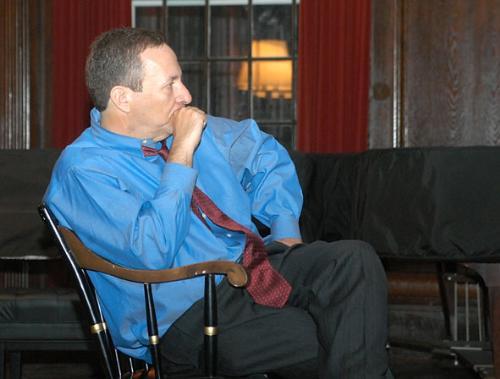
News
Summers Will Not Finish Semester of Teaching as Harvard Investigates Epstein Ties

News
Harvard College Students Report Favoring Divestment from Israel in HUA Survey

News
‘He Should Resign’: Harvard Undergrads Take Hard Line Against Summers Over Epstein Scandal

News
Harvard To Launch New Investigation Into Epstein’s Ties to Summers, Other University Affiliates

News
Harvard Students To Vote on Divestment From Israel in Inaugural HUA Election Survey
Summers Discusses Revised Curriculum

The revised undergraduate curriculum will lessen the burden of academic requirements on students and offer more electives, University President Lawrence H. Summers told a group of about 20 students, tutors, and House Masters at a sedated study break in the Kirkland House Junior Common Room last night.
“I am convinced from talking to students and observing the current [academic] system that our students have to contend with too many requirements, and the system is too complicated and difficult to understand.” Summers said. “I hope that our new system will be less burdened by requirements and offer more student choice.”
Summers added that he wanted to make the new academic system “easier to navigate than the system of today,” and stressed the importance of sustaining “the liberal arts” and not “instrumentalizing education.”
The College launched its curricular review last year, and a committee will make recommendations by the end of this semester.
Summers noted that the review was not just confined to academics, but would be more “broad,” to include “the entire undergraduate experience.” He said that the College needed to make improvements to student services as a whole, particularly to student social spaces and mental health.
“Harvard stands up very well to its peer institutions,” Summers said, “but it is clear that we need to do more [with regards to mental health]. There is an unmet need…and we need to organize our resources.”
Referring to the suicide of Winthrop junior Anthony Fonseca last weekend, Summers noted the importance of “maintaining a strong sense of community.”
Students at the study break voiced concerns that there are not adequate social spaces for undergraduates to interact on a regular basis.
“Making places where students can readily find each other might help the mental health problem,” Berenika D. Zakrzewski ’05 said. “I mean, look at Loker Commons, which is in a basement—I don’t know anyone who hangs out there.”
Summers said that he admitted to having “real concerns about spaces for students to gather that are not private [final] clubs,” but didn’t think the lack of social space was responsible for the grinding unhappiness of the student body.
Students also raised issues of community in the context of technology—evidenced in the recent start-up websites like CrimsonHookups.com and thefacebook.com.
Summers was unaware of the existence of thefacebook.com, and he said that while he believed “various kinds of matching systems and e-mail services”—including his own open e-mail address, lawrence_summers@harvard.edu—“can make positive connections,” he also added that “technology can encourage people’s tendencies to isolate themselves and spend more time in front of a screen.”
Students at the study break maintained that websites like thefacebook.com fostered connections and helped students find common interests.
“You see everyone’s picture, and let’s say you like The Roots, you can search the site for everyone else who likes The Roots,” Samuel W. Lessin ’05 explained to Summers.
“What are The Roots?” Summers responded.
“A band,” the crowd replied, laughing.
“Oh, I thought it was a psychedelic substance,” Summers said.
And while Summers may not be deeply rooted in hip-hop culture, he expressed his strong commitment to the visual and performing arts at Harvard.
“In many ways, the arts are the highest achievements of man,” Summers said, “and universities have always been focused on humanities.”
Summers added that he was concerned that there is a disparity between critiquing and creating works of art.
“You don’t have to be particularly accomplished to study macroeconomic theory or European history,” he said, “but you do if you want to study creative writing or musical performance. That is problematic.”
Summers also added that he hoped to see the University develop more respect for the arts and more “explicit academic evaluation” in the future.
—Staff writer Lauren A. E. Schuker can be reached at schuker@fas.harvard.edu.
Want to keep up with breaking news? Subscribe to our email newsletter.
